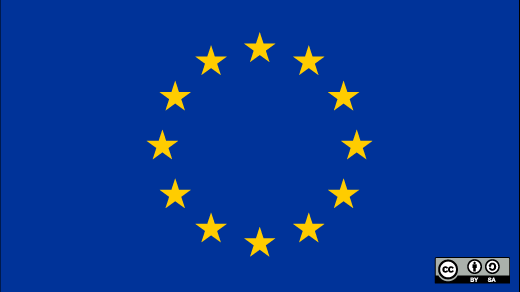The European Commission (EC) wants to make it easier for its software developers to submit patches and add new functionalities to open source projects. Contributing to open source communities will be made central to the EC’s new open source policy, expects Pierre Damas, Head of Sector at the Directorate General for IT (DIGIT). “We use a lot of open source components that we adapt and integrate, and it is time that we contribute back.”
Damas and his colleagues aim to remove barriers that hinder code contributions to open source software, he announced yesterday at a conference in Brussels. The Commission wants to clarify legal aspects, including intellectual property rights, copyright, and which author or authors to name when submitting code to the upstream repositories. “It is easier said than done,” Damas warned.
He anticipates that reinvigorating the policy will motivate many of the EC’s software developers and functionaries to promote the use of free and open source software at the EC. “Having a strategy helps them to advance the use of open source.” The policy can help nudge others to consider open source, Damas added. “When a little push is needed.”
On Wednesday, December 3, the Head of Sector gave a preview of the EC’s open source policy at a workshop on open standards for ICT procurement. The update of the EC’s policy is a work in progress, and will be finalized in the first months of 2015.
Priority
EC policy makers recognise that open source reduces their ICT costs, makes possible the modernisation of government services and will strengthen European ICT service providers, Damas said. “Our internal policy is changing, and open source use will be given promoted. When procuring software products, we will consider open source alongside proprietary alternatives, based on value for money. In defined areas, for example Information Systems development distributed externally, we will give open source priority.”
The EC is already using a lot of open source tools, he added, including for servers, for its web solutions and on the EC desktops. “We have over 10,000 Apache web servers, over 1800 hosts running Red Hat Linux and Drupal will be the core engine of the new Europa website. Our developers use a lot of open source tools and code libraries.”
Gently disruptive
DIGIT is not considering the restart of a Linux desktop pilot. A small-scale pilot already took place in 2005, with two hands full of EC volunteers at DG INFSO using Linux and OpenOffice, showing that a Linux desktop was feasible, Damas said. However, the exit costs—to move away from the proprietary system—were too high.
“Our future office environment however, will be gently disruptive. We will propose alternatives for direct messaging, groupware and other parts of the infrastructure.” When the time comes to renew the office solutions, the EC will not forego a negotiated procedure, but instead will publish a tender, using technical specification. “We are aware of the changing environment”, Damas said.
Gijs Hillenius writes original articles for the Joinup project of the European Commission. His articles are republished here with permission. Originally posted on the Joinup blog.







3 Comments